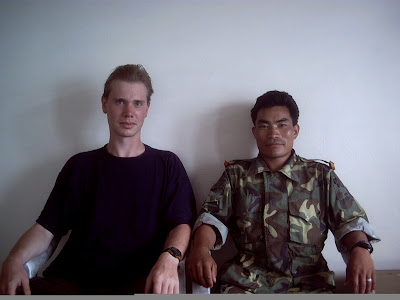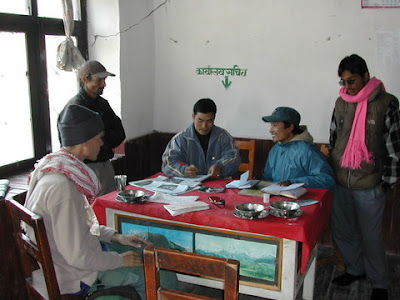Niraj Aryal
Kathmandu, Niraj Aryal: It’s hardly been two weeks Nepal’s Army Chief, Rukmangad Katuwal returned home from the Indian pilgrimage wherein he was reported to have been offered a “red carpet welcome” by the Indian establishment. Reportedly, Nepal’s Army Chief met the Prime Minister, Home Minister, Defense Minister and India’s national security advisor, to name a few in the list of the movers and shakers of India’s politics whom he met during his short stint there, though he was also reported to have traveled to South to get a glimpse of the living Indian deity Sai Baba- whose followers could well be found here in Nepal. More importantly, Katuwal, unsubstantiated though reports, met the outgoing chief of India’s notorious intelligence agency RAW (Research and Analysis Wing), Ashok Chaturvedi, two times in merely fifteen days, first in New Delhi and the next meet took place right here in Kathmandu, when the later had sneaked into Kathmandu for a four day stint, last week. The RAW chief reportedly, stayed at the Hyatt regency Hotel in Kathmandu.
It could be a mere conjecture only but Katuwal’s return home coincided with the Nepal Army refuting claims made by some newspapers in Nepal. The newspaper reports quoting the Maoists’ leadership had it that talks were on in between the Maoists leadership and the Nepal Army’s high ranking officials to initiate steps towards integrating the Maoists’ militias within its domain. However, to the dismay of the Maoists’ leadership, the NA in its refusal statement held that, “…it was merely a ploy to malign the credentials of the National army”. The question is thus as to whom from the two camps were lying? Obviously, the Maoists who have the habit of making false revelations now and then would be adjudged making fool of the people more so, the media. “But there are proofs of such meets taking place at least three times in the past between the two rivals of by gone era”, said Padma Ratna Tuladhar-the leftist rights activist, talking to a local FM radio station here in Kathmandu, Monday, December 24, 2005.
Now, the point is that if the statement coming form the Army camp is not just a mere conjecture and according to Mr. Tuladhar a false claim, then there must be something underneath. The point here is that such views were being aired by the Maoists’ leadership since long, at least from over a month or so, but the NA statement came only after Katuwal returned home from Delhi trip, obviously a delayed statement. What does this indicate then, perhaps only that India does not want the National Army to unite with the Maoists’ Militias- makes no difference that agreements were made in between the real stakeholders of Nepali politics in the past in regard to the integration of Militias into the National Army? Which, say analysts, the Indian leadership might have aired Katuwal when they met him in India. Obviously, they needed that as well, only because they might have started feeling the brunt of elevating the ranks of the Maoists in Nepali politics and that too at a time when the Militias were possibly, though only limited in theory, being integrated into the Nepal Army. The Militias who have been indoctrinated of the anti-India sentiments by their leadership throughout the rebellion period and even asked to build trenches to fight the real enemy-India (sic Maoists’ leadership), India does not want that to happen either.
Back to Katuwal again, if Indian leadership can talk differently to different Nepali political leadership, it is anybody’s guess that Katuwal too was told something completely different. What the leadership there told Katuwal verbatim is difficult to comprehend but it is for sure that strong “NO” signal to the possible NA-Maoist Militia merger was whispered into Katuwal’s ear. If not, why the NA was claiming that their much publicized meeting with the Maoists’ leadership was false?
To add to the point as to why India does not want NA-Maoist Militias merger, it might also be because India in the past had submitted proposals to then rulers to minimize the size of the security personnel here only to hand over Nepal’s security stakes to India. Such Indian designs only became public after such successive regimes failed to prevail in Nepali politics. Take for instance, what the then Prime Minister Marich Man Singh had told during a mass meet in Kathmandu. Mr. Singh had claimed that India had submitted a proposal to King Birendra for handing over Nepal’s security matters to India, be it the security issues, internal one or external both, if the system of Panchayat was to continue. After few years as Gyanendra-most probably Nepal’s last monarch, took over after King Birendra got killed in an inner family feud, he too was forwarded with a similar proposal which were only but rejected on both the occasions. Gyanendra toeing his brother Birendra’s footstep rejected such an offer, which could have otherwise ensured longer life for his unpopular regime in the country.
The point here is that with the possible integration of the Maoists Militias with the National Army, the strength of the National Army will be enhanced numerically. This, in essence, is what India does not want in any pretext or the other. And that is also against India’s age old doctrine outlined by none other than Jawahar Lal Nehru- India’s first Prime Minister.
Then, all of a sudden and that too close on the heels of Katuwal’s India visit, the outburst of India’s PM Man Mohan Singh against the Maoist rebels operating in India comes. Mr. Singh, otherwise, a lame duck prime minister, making sharp comments against the Maoists even called their movement as the single biggest security threat to his country and also dubbed the Maoist as a "virus".
Singh was addressing a conference on internal security attended by the chief ministers’ of the Maoists affected States in India last week wherein he vowed to take stringent measures against those involved in Naxal activities. However, only few years’ back, Mr. Singh while addressing a similar conference had said the same thing but in the mean time the Naxal movement there only got amplified with the working class exploited more as a result the development indices rose sharply and also unexpectedly.
Now that there are concrete proofs that the Nepal Maoists are indulged in activities aiding their Indian counterparts (so claim Indian media reports), it is only but natural that India would love to see a quick downfall of the Maoists in Nepal. But to the utter dismay of the analysts here, how India proceeds in its “Design Next” in Nepal is difficult to comprehend at least for the moment…however, it is simple to say that as the return of Kingship in Nepal is becoming more and more difficult, the NA might be lured instead in the future to counter the Maoists.
Source: Telegraph Nepal, December 26, 2007







